America
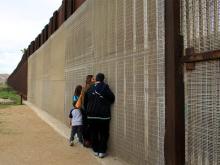
President Trump’s proposed border wall with Mexico raises serious questions about America’s moral standing, as the poor would bear the brunt of the suffering, a leading Catholic theologian says.
The Rev. Daniel G. Groody, an associate professor of theology at Notre Dame University in Indiana, said the wall would lead to a loss of life, as migrants are forced to find other ways to escape poverty across the border.
“What Trump fails to see is that state sovereignty is not an absolute privilege, but a moral responsibility,” said Groody.
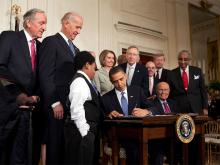
Bishops will examine proposals to amend or replace Obamacare but said that “for now that a repeal of key provisions of the Affordable Care Act ought not be undertaken without the concurrent passage of a replacement plan that ensures access to adequate health care for the millions of people who now rely upon it for their wellbeing.”
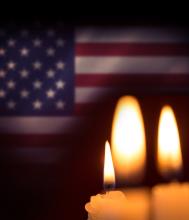
I sat on the first wooden pew of the Metropolitan AME Church in Washington, D.C., on New Year’s Eve, with 500 faithful from across the country and thousands who watched online, to worship, testify, and encourage each other.
We came together in the tradition of the 1862 “watch night” service, when enslaved and free African-Americans, abolitionists, and others awaited news that the Emancipation Proclamation would become law and would free black people living in the South. We came together also in the tradition of Jesus, who told his disciples to “keep awake” while he prayed on the night before his crucifixion.
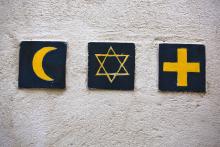
Imagine receiving this message on your voicemail: “Dear Mr. Gonzalez, we regret to inform you that your heart surgery has been canceled. The medical professionals scheduled to perform it, Doctors Sarna and Latif, have discovered that they have serious disagreements about Middle East politics. Consequently, they are refusing to work together. We will do our best to find you other doctors, before your condition becomes fatal.”
Seem far-fetched? In my mind, it is the logical outcome of the manner in which many Jewish and Muslim groups have chosen to engage each other in recent years. Or, rather, not engage.

If I’ve learned anything since my time in Rome, it’s that people — not just Catholics — are hungering to connect peace with justice. This is why those of us who traveled to Rome just before the election, accompanied by Stockton, Calif., Bishop Stephen Blaire, and Houma-Thibodaux, La., Bishop Shelton Fabre, are preparing for a regional WMPM meeting in Modesto, Calif., in February.
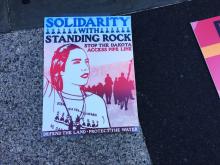
Dec. 4 was a beautiful reminder, in the long struggle for justice, that, no matter how long we wait, God hears our cry. And love and justice will win.
A few weeks ago, Chief Arvol Looking Horse issued an invitation to clergy and faith leaders to stand in solidarity with the people of Standing Rock. He said he was hoping maybe 100 would respond. But I joined thousands, in a procession of faith leaders, to gather around the sacred fire at the Oceti Sakowin Camp at Standing Rock.
I knew something special was happening here.
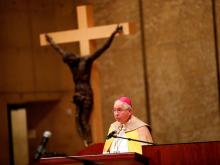
A week after Donald Trump’s stunning election as president sent the country’s governance lurching to the right, the nation’s Catholic bishops sent a message of their own — at least on immigration — by putting Mexican-born Archbishop Jose Gomez of Los Angeles in line to become the first Latino to lead the American hierarchy.
But the vote at their annual fall meeting in Baltimore on Nov. 15 also suggested that the U.S. Conference of Catholic Bishops is still hesitant to fully endorse the more progressive and pastoral approach to ministry that Pope Francis has been championing since his election in 2013.

Americans voted largely along the lines of race, education, and party identification. Nonwhites strongly preferred Clinton, while whites decisively chose Trump. Compared with past Republicans, the businessman received a stunning surge of votes from non-college-educated white voters.
None of this is surprising.
And yet the result upends so much conventional wisdom.
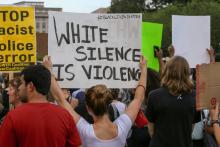
Stop telling me to fight. Stop saying on your social media platforms, and in your blogs and your op-eds, that everyone should dust themselves off and get up and fix this. Stop saying that addressing this issue is everyone’s duty, because I can’t even begin to explain to you how far from the truth such a statement is.
But I’ll try. I will overcome my exhaustion and explain this to you as clearly as I can, and you can thank me later, if you’re so inclined. Let it be known that I like Edible Arrangements.

In the summer of 430, the great Christian writer and bishop Augustine of Hippo lay dying as barbarians besieged his North African city – basically a mop-up operation in the slow-motion fall of the Roman Empire.
Today, in the fall of the year 2016, a lot of Christians can relate.

The City Council in the nation’s capital has overwhelmingly voted for a bill that would allow terminally ill people a medically assisted death.
That makes Washington, D.C., the sixth jurisdiction nationwide to approve what opponents often call “physician-assisted suicide.” The bill would legalize it for those who have six months or less to live, who do not suffer from depression, and who request the option several times.

After quietly removing panes bearing the Confederate flag from its stained-glass windows, leaders of the Washington National Cathedral are now wondering what to do about remaining images of Confederate generals Robert E. Lee and Stonewall Jackson.
"How can you justify having those windows in a house of God?" challenged Riley Temple, a former board member of the Washington National Cathedral's foundation.

In 2013, Francis provoked an outcry from economic conservatives with the release of his apostolic exhortation, “Evangelii Gaudium (The Joy of the Gospel),” which was widely seen as his personal manifesto. In it, Francis said the world could no longer trust “the unseen forces and the invisible hand of the market,” and called for ecclesiastical renewal and compassion for the poor.
Cox, who taught at Harvard for 50 years, dedicated his latest book to the pope because they share a concern about what Francis called a “deified market” that’s creating “new idols.”
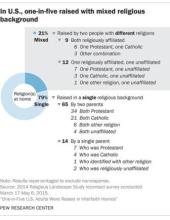
The poll, conducted by the Pew Research Center, also found that, of those raised this way, most had one Protestant, or Catholic parent, and one religiously unaffiliated — sometimes called a “none” — parent.
“To be sure, religiously mixed backgrounds remain the exception in America,” the report on the poll states. “But the number of Americans raised in interfaith homes appears to be growing.”

White Christian nationalism is back in full force. White Christians will need to do everything in their power to stop it — even those of us who avoid politics. When interviewed about Donald Trump’s success last week on NPR, former Republican presidential candidate and adviser to three presidents Pat Buchanan argued for a white, homogenous America, claiming that diversity of language and culture undermines our nation.
White nationalism is idolatry, plain and simple. As Christians our allegiance is to God, not to the American flag. “God’s country” is not the U.S.A but the whole human race, which is created in the image of God — no matter the race, no matter the religion. Our biblical alarm bells should go off when we hear candidates or neighbors say the U.S. is more special to God than other countries, particularly if it's that our whiteness is what makes us great. This is heresy.
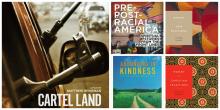
Four August culture recommendations from our editors.
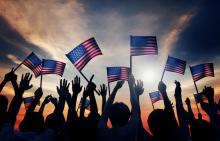
Let’s talk about we.
You know: The first word in the constitution. The one that puts everything that follows it inside a framework of a collective effort and combined responsibility. "We the people." All of us. Together. Part of something bigger than any one of us individually. Yeah, that word.
Have you noticed that we don’t discuss that idea very much? I wonder why. A lot of Fourth of July posts this year went on lavishly about individual rights and personal freedom. And yes, those are important. But they’re only part of the equation, and they’re not even the starting point. It starts not with me, but with we — a pronoun that is radical and revolutionary.
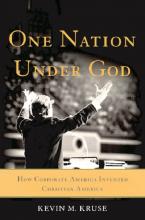
IN A RECENT interview, Wendell Berry reiterated how perplexed he was that many Christians who are guided by a deep love for God can participate so willingly in an economy that is rapidly devastating God’s creation. In his new book One Nation Under God: How Corporate America Invented Christian America, Princeton historian Kevin Kruse offers a narrative that sheds light on how our churches got into the mess that Berry bemoans. As the book’s subtitle indicates, the primary story that Kruse traces is that of the genesis of “Christian America,” which unfolded not in the era of the Founding Fathers, as David Barton and other conservative Christians contend, but rather in the mid-20th century with industrialists who rallied churches to oppose FDR’s New Deal.

THE GRAINY, STUTTERING surveillance footage shows police milling about, offering no medical assistance to the 12-year-old boy, Tamir Rice, one of them has just shot. They only spring into action when the boy’s older sister runs into the frame toward her brother. An officer tackles the girl, knocking her back in the snow, then cuffs her and puts her in the patrol car, only a few feet from her dead or dying brother.
This extended footage, released in January, and bystander cell phone footage from a few minutes later with audio of the sister wailing over and over “they killed my brother,” brought into my head the Good Friday spiritual “Were You There?” It was another moment, in months of unrest over police killings of black adults and children, when the question pressed in on me as a white person. “Were you there? Were you there when they choked my father dead? Were you there when they shot my son? Were you there when they killed my brother? Were you there?”
While books and other cultural works are no substitute or shortcut to the spiritual work of true repentance and detoxifying from cheap grace, they can be means of deepening understanding and finding the resolve to take action. Along with the film Selma, following are some of the artistic resources I’m turning to this Lent.
In Dawn Cherie Araujo’s article, “Grace-Filled Moments” (Sojourners, January 2015), she explores the rising gun violence in Indianapolis and the ways local churches have taken stands to support families and rise up against the prevalence of grief in their communities.
What are groups like the Church Federation of Greater Indianapolis facing as they combat gun trafficking and violence? Check out the interactive infographic below and learn about the United States’ tumultuous relationship with guns. What are your state’s gun laws?